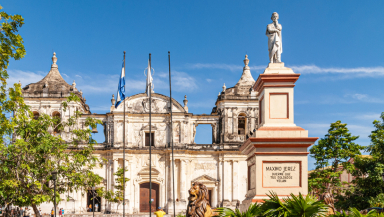
(CP) The Nicaraguan government has canceled the legal registration of 1,500 nonprofit organizations, including churches, intensifying a years-long crackdown in this Central American nation. A notice in the government Gazette, La Gaceta, claimed these groups were non-compliant with financial reporting requirements spanning one to 35 years.
The notice in the Gazette, published on Monday, listed the 1,500 organizations. It includes 695 religious groups primarily associated with Catholic, Evangelical and Pentecostal denominations, according to CNN.
Historically, the Ortega government's focus had been primarily on the Roman Catholic Church, especially in areas where church leaders vocally opposed human rights abuses. However, the latest closures indicate a significant expansion of this policy to include Evangelical churches, which were previously less involved in political matters.
"All of their properties are going to be confiscated. This is an attack against religious freedom," The New York Times quoted Martha Patricia Molina, a Nicaraguan lawyer who now resides in Texas after fleeing in 2021, as saying.
Félix Navarrete, a Nicaraguan lawyer and Catholic church activist, underlined the symbolic importance of churches in the fight for truth and change in Nicaragua. "One of the government's biggest fears is that through religious leaders, the people of Nicaragua can have change," Navarrete was quoted as saying.
The action is part of a pattern under President Daniel Ortega, who secured a controversial fifth term in 2021. The ruling regime of the far-left Sandinista National Liberation Front has been marked by the suppression of opposition, with numerous political candidates, journalists and activists arrested under ambiguous national security laws.
The closures and subsequent property seizures are ostensibly justified by the government's stringent financial reporting laws, purportedly to combat terrorism and money laundering. However, these laws have been widely criticized for facilitating the persecution of religious communities.
A June report by the U.S. Commission on International Religious Freedom listed increasingly repressive actions against these communities, including threats and surveillance of church services.
Seven detained Catholic priests were recently exiled to Rome. The clergy, detained by the National Police in the Diocese of Matagalpa under Bishop Rolando Álvarez — an outspoken critic of the regime — were held under house arrest and at the National Inter-Diocesan Seminary of Our Lady of Fátima before their expulsion. The exiled group includes senior diocese leaders Fathers René Vega Matamoros and Edgard Sacasa, who led the diocese following Bishop Álvarez's earlier exile.
According to Vatican News, since October 2022, the government has forcibly exiled several groups of priests as tensions between the state and church escalated.
The other nonprofits that have lost their registration range from sports clubs, such as basketball and soccer teams, to various activist groups.
The United Nations Human Rights Office, through spokesperson Liz Throssell, described these actions as "deeply alarming," noting a significant erosion of civic space and religious freedom in Nicaragua.
According to Nada al-Nashif, U.N. Deputy High Commissioner for Human Rights, since late June 2022, over 5,000 NGOs, media outlets and private universities have seen their legal statuses revoked. Throssell said the human rights situation in Nicaragua has drawn "grave concern" from the U.N., with at least 35 arrests since March aimed at closing down civic engagement.













